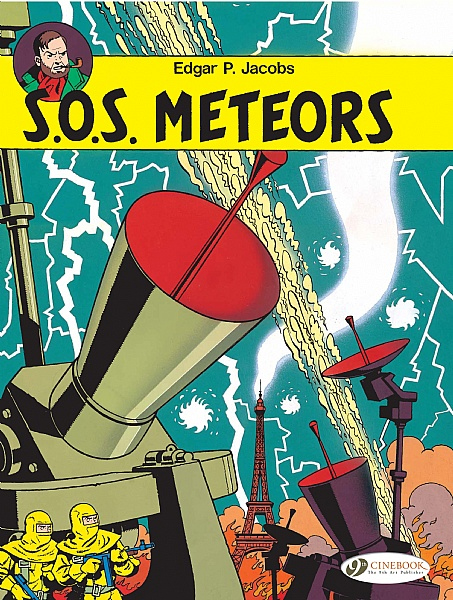 By Edgar P Jacobs
By Edgar P Jacobs
Publisher: Cinebook
ISBN: 978-1-905460-97-7
Volume six of this series sees a return to one of the works by the original creator, Edgar P Jacobs. As mentioned in a previous review, he's a close relative and collaborator of Hergé, working alongside him on some of Tintin books, and that style and storytelling is very much apparent within the Blake & Mortimer books.
At present, on the news, the world appears to be consumed by global disasters related to the weather, so I was rather intrigued to pick up a work first created in 1959 and read much more of the same. In fact, in the book, the climatic catastrophes are centred in the West, but there appears to be no rhyme nor reason to explain them. Professor Mortimer has been asked to travel to France to work with his French counterpart in unravelling the situation, but on route the worsening weather contrives to confound the journey which ends up with Mortimer being separated from both the taxi and its driver. Narrowly evading drowning, Mortimer eventually ends up at Professor Labrousse's house, but when the taxi driver fails to reappear Mortimer becomes the prime suspect. Fortunately Captain Blake is also in France and Mortimer is able to outline the problem to him before disappearing off in an attempt to retrace his steps of the evening before and make sense of what could have gone wrong. What he discovers is the source of the dreadful weather and a plot that has barely begun its mischief.
In today's world of action heroes with chiseled looks, five-o'clock shadows and six packs, Mortimer is a very unlikely hero. A scientist with mutton-chop whiskers and a pipe, he is very much a man of another era, but the more books I read the more I enjoy this take on the hero. Really, he's a slightly-more fussy, better dressed Indiana Jones and he seems to have worked out alright. Mortimer is as happy to apply his knowledge and reasoning to a situation as he is fists, and then there's always the David Niven-like presence of Captain Blake to back him up with the resources of Her Majesty's Government.
Like the other early Blake & Mortimer books, these are very wordy, more than happy to explain the situation through in great detail with talking heads as opposed to illustrating the thoughts or conversation in a more cinematic storyboard style. Not that I'm saying words are a bad thing, but when a succession of panels are three-quarters full of text you begin to wonder if the story couldn't have been pushed forward through more creatively. But that's a minor niggle, and indeed part of its overall charm.
It would be wonderful if the up-and-coming Tintin movies also allow for better exposure of Blake & Mortimer by its loose association. It certainly deserves a wider audience.
And if you liked that: Volumes 7 & 8 are currently available



No comments yet.